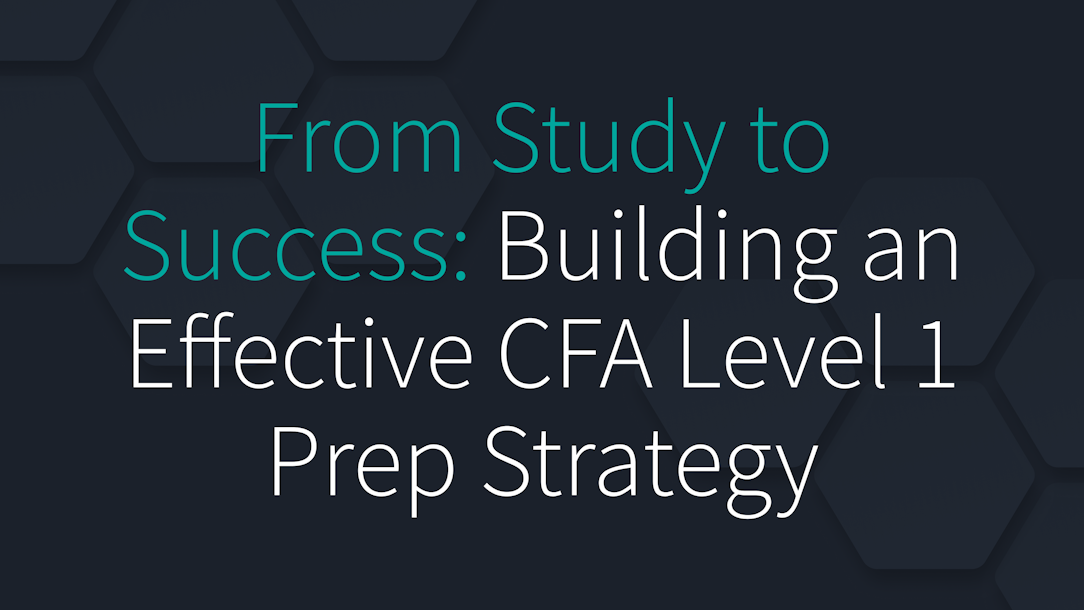
From Study to Success: Building an Effective CFA Level 1 Prep Strategy
The CFA Level 1 exam is challenging, but with a well-crafted study strategy, success is entirely within your reach.
The CFA Level 1 exam is the first major hurdle for anyone looking to become a Chartered Financial Analyst. With a vast syllabus covering 10 different topics, from ethics to financial reporting, the breadth of material can be overwhelming.
The key to conquering this exam lies in developing a well-structured, personalized prep strategy. In this blog, we’ll guide you through building a plan that ensures you’re not just prepared, but confident when exam day arrives.
Understanding the CFA Level 1 Exam Structure
Before diving into CFA Level 1 prep, it’s critical to understand what the exam entails. The exam covers 240 multiple-choice questions split into two three-hour sessions. The questions cover a wide range of topics, with varying levels of difficulty and weight. Heavier-weighted sections such as Financial Reporting and Analysis, Ethics, and Quantitative Methods deserve special attention, as they can make or break your score.
Time management is key here. You have roughly 90 seconds per question, so practice answering questions with speed and accuracy. Understanding the structure will help you allocate your study time wisely, focusing on high-yield areas that can boost your score.
Crafting a Personalized Study Plan
An effective study plan is your blueprint to success. Start by setting a realistic timeline. The CFA Institute recommends at least 300 hours of study, but this varies depending on your familiarity with the material. A study schedule spanning four to six months typically works well for most candidates, allowing sufficient time for learning and review.
Allocate Your Time Smartly
Not all topics are created equal. Allocate more time to subjects like Financial Reporting and Ethics, as these carry significant weight. Don’t neglect difficult subjects like Derivatives or Quantitative Methods, though—mastering even the smaller topics can push you over the passing threshold.
Active Learning Techniques
When it comes to learning, be active, not passive. Simply reading the material isn’t enough. Incorporate methods like spaced repetition, flashcards, and note-taking to ensure retention. Try to solve practice problems alongside your reading sessions to apply what you’ve learned immediately. Active learning makes your study sessions more engaging and effective.
Leveraging CFA Curriculum and Study Resources
The official CFA curriculum is an invaluable resource, providing the most comprehensive coverage of exam topics. Use it as your primary guide, but don’t shy away from supplementing it with third-party materials. Study guides from trusted providers can help distil the material into more digestible chunks, saving you time while ensuring comprehension of key concepts.
Third-Party Materials
Be selective when using third-party study materials. While they can provide helpful summaries and alternate explanations, balance them with the CFA Institute’s content to ensure you’re not missing any crucial details. Use them to reinforce concepts, clarify tricky topics, and give you a fresh perspective on hard-to-understand areas.
Mastering Practice Questions and Mock Exams
Practice makes perfect, and this is especially true for the CFA Level 1 exam. Regularly practicing with exam-style questions will help you build both your speed and accuracy.
Start Practicing Early
The sooner you integrate practice questions into your study routine, the better. Practice questions not only reinforce what you’ve learned but also highlight areas where you may need additional review. Aim to complete multiple mock exams as you get closer to exam day to simulate real test conditions and build stamina.
Analyze Your Performance
Don’t just focus on the score—analyze your mistakes. Understanding why you got questions wrong is key to avoiding similar errors on exam day. Identify weak areas and adjust your study plan accordingly, dedicating more time to those subjects that consistently challenge you.
Ethics: A Critical Component
Ethics is often called the “make or break” section of the CFA exam. Its importance cannot be overstated, as it can determine your pass or fail status, especially if you’re on the borderline. Make sure to review the CFA Institute’s Code of Ethics and Standards of Professional Conduct thoroughly and integrate ethics questions into your daily practice.
Test Day Strategy and Exam Techniques
No matter how well you prepare, test-day nerves can affect your performance if you don’t have a strategy. Stick to the plan you’ve practiced during mock exams: manage your time, pace yourself, and avoid spending too much time on any one question. If you’re stuck, eliminate wrong answers to make an educated guess and move on.
It’s also important to stay calm. On test day, nerves can easily cloud your thinking. Stay focused, take deep breaths, and keep your eye on the clock.
Conclusion: Turn Your Study Plan into CFA Success
The CFA Level 1 exam is challenging, but with a well-crafted study strategy, success is entirely within your reach. By breaking the syllabus down into manageable parts, dedicating time to the most critical areas, and using practice questions to fine-tune your performance, you can approach exam day with confidence.
At Salt Solutions, we’re here to help you succeed. Whether you’re just beginning your journey with CFA Level 1 or moving on to CFA Level 2 and CFA Level 3, our study guides and materials are designed to equip you with the tools and strategies you need for success. Join our community of CFA candidates and take the next step toward mastering the exam!